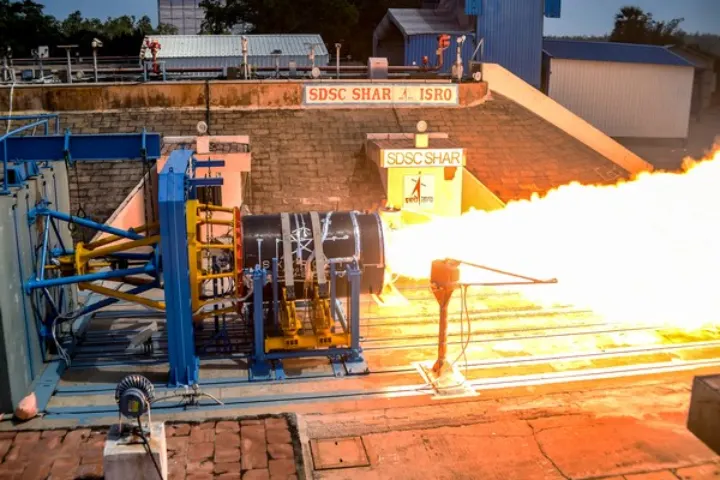

Visual from the spot. (Photo: Skyroot Aerospace)
In a significant development towards its upcoming orbital space launch, Skyroot Aerospace, a Hyderabad based space-tech company, has successfully test-fired the Stage-2 of Vikram-1 space launch vehicle, called Kalam-250, at the Satish Dhawan Space Centre (SDSC) in Sriharikota.
Vikram-1 launch is slated to be a landmark event for the Indian space sector as its first private orbital rocket launch, and follows the remarkable suborbital space launch of India’s first private rocket- the Vikram-S by Skyroot in November 2022.
The test, which lasted 85 seconds, recorded a peak sea-level thrust of 186 kilonewtons (kN), which will translate to a fully expanded vacuum thrust of around 235kN in flight. The Kalam-250 is a high-strength carbon composite rocket motor, which uses solid fuel and a high-performance Ethylene-Propylene-Diene terpolymers (EPDM) thermal protection system (TPS).
The stage houses a carbon ablative flex nozzle along with high-precision electro-mechanical actuators for thrust vector control of the vehicle, which helps the rocket achieve the desired trajectory. This test also had an important contribution from another centre of ISRO, the Vikram Sarabhai Space Centre (VSSC), which supplied its proprietary head-mounted safe arm (HMSA) for the test, used for the safe operation of the rocket stage.
The solid propellant in Kalam-250 was processed by Solar Industries at their unique facility in Nagpur. Skyroot had previously tested Kalam-100, the third stage of Vikram-1, which was test-fired successfully in June 2021. Stage-2 is a critical stage in the ascent of the launch vehicle, as it propels it from atmospheric phase to the deep vacuum of outer-space.
Pawan Chandana, Co-Founder and CEO stated “This is a significant milestone for the Indian space industry, marking the successful test of the largest propulsion system ever designed and manufactured by the Indian private sector so far, and the first carbon-composite-built motor tested at ISRO. All test parameters are within expected bounds, and this achievement takes us another step closer to the upcoming orbital launch of the Vikram-1 rocket.”
Naga Bharath Daka, Co-Founder and COO of Skyroot said, “In this landmark test, we validated the critical system for the launch–the flex nozzle control system–during firing for the first time, making this an important milestone in our journey. We have a few more milestones to cross and are focused on achieving them in the coming months to reach our maiden orbital launch of the Vikram-1 in 2024. We have been steadily progressing on our milestones due the perseverance and dedication of our incredible team, and the excellent support from IN-SPACe and ISRO.”
The 13th edition of the India-Italy Military Cooperation Group (MCG) meeting was successfully conducted from…
Taiwan's Coast Guard Administration (CGA) issued a strong condemnation of China for supporting illegal fishing…
Naseem Baloch, Chairman of the Baloch National Movement (BNM), appealed for unity among "oppressed nations"…
The Production Linked Incentive (PLI) scheme for telecom and networking has generated export sales exceeding…
Prime Minister Narendra Modi on Saturday reaffirmed India's commitment to conserve water and promote sustainable…
Baloch Human rights leader Mahrang Baloch was arrested by Pakistan's Quetta Police and administration early…